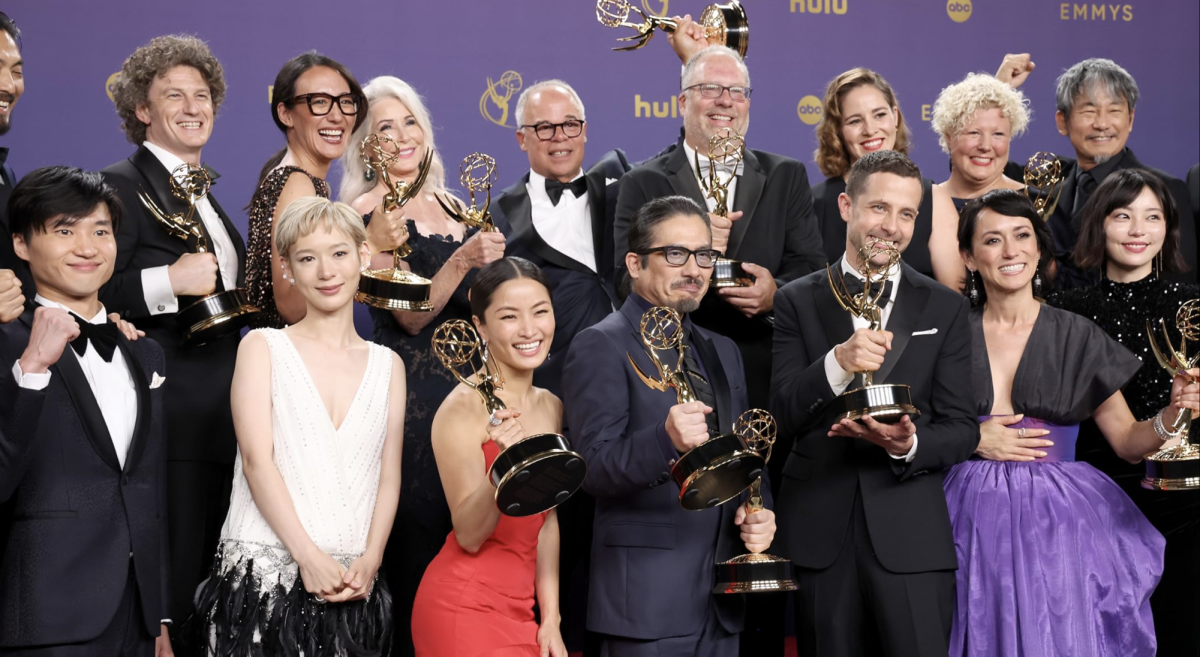In their 76th year, the Emmys have long since cemented their reputation as the ultimate judge of prestige and talent in television. With my hopeful picks for this year and my cup of tiramisu in hand, I was prepped and ready for television’s biggest night.
As I watched, however, it became clear something was amiss. The laughter was scattered, fading in and out from the microphone more than usual. The speeches were covered in orchestral music barely 30 seconds in. The pattern was clear: Award shows have been falling victim to the same tired formula, and with the Emmys, the killer had struck once more.
At first glance, the many moving parts of the Emmys seem to form a picture of a typical award show. Hosts Eugene Levy and Dan Levy, the father-son comedy duo well known for their work together in “Schitt’s Creek,” delivered their beginning monologue with a natural chemistry that brought a well-crafted, amusing beginning to the night.
The ceremony also played with interesting ideas as part of its overarching theme of reunions. In particular, this theme was seen clearly when some presenters were grouped together by their previous well-known roles in television tropes such as TV dads, moms, doctors and lawyers. The sets in which these presenters were introduced were small ecosystems in and of themselves. Live television sets with detailed backgrounds, props and extras accompanied the presenters on stage. When Jane Lynch (Sue Sylvester from “Glee”) and Brendan Hunt (Coach Beard from “Ted Lasso”), both TV coaches, were presenting, sets of lockers and racks of sports equipment were rolled on stage as the electronic background changed to the familiar tiled walls of a locker room.
However, these creative strengths were not enough to save the Emmys from their tragic fate. Overall, there was a burdening air of exhaustion to the program, exacerbated by the ceremony’s strict schedule, which often prevented the winners from making their speeches.
Time limits on acceptance speeches is not a bad idea in general, but the 45-second cap seemed to impede the pacing of the show as well as the ability of the honorees, especially first-time Emmy winners, to process and form coherent sentences. Often, the camera would pan immediately away from the winner to the next award presentation, moving at a breakneck speed that felt unnecessary for a show that’s already three hours in length.
Ultimately, the biggest factor in the demise of the Emmys is arguably their primary focus: the awards. The U.S. entertainment industry has long been criticized for its overall lack of recognition given to diverse stories. However, a greater variety of stories have gotten a chance to shine in recent years as reflected in this year’s Emmys, which feature shows such as “Shogun,” a Japanese period piece detailing the complicated political and societal landscape of Japan at the onset of the 17th century. “Shogun” broke records at the 76th Emmys, taking home both lead acting awards and best series in the drama category. It’s both encouraging and inspiring to see a show with nearly all its dialogue in Japanese — and therefore requires the full presence of subtitles — be recognized for its wonderful storytelling and performances. Yet the excitement brought by shows like “Shogun” feels rare to the Emmys, which leads me to what I believe is the true killer: predictability.
When I first looked at the nominees for outstanding lead actor in a comedy series, one name jumped out as the likely victor: Jeremy Allen White of “The Bear.” Although I love Martin Short’s performance in season 3 of “Only Murders in the Building” and D’Pharaoh Woon-A-Tai’s performance in the final season of “Reservation Dogs,” I felt that, based on how the previous year went, there was a smaller chance of them winning. Indeed, White took home the award for the second year in a row. While there is nothing inherently terrible about honoring the same good shows again, it does feed into the cycle of only celebrating a certain selection of stories.
With the Emmys, the odds of new and exciting stories being nominated seem slim to none, let alone the chances of actually winning the award. To me, this is why the “Shogun” sweep was exciting to see. Predictability is not exactly the most fascinating culprit of this crime; however, it’s one that is a consistent and surprisingly effective method to tune out interest.
While watching the results unfold, I was left wondering if it was really a lack of quality storytelling in the television industry that caused this predictability to grow or if it was simply the Emmys’ narrow look at what is currently present in the world of television. Though formal recognition is not necessary to have an amazing show, award recognition — especially recognition from a well-established ceremony such as the Emmys — is undeniably one of the forces that influences what executives greenlight and what is eventually put onto our screens.
While the Emmys are still recognizing amazing storytelling and performances, I want to be able to see new names and stories across those nominations. I want to be able to see these stories have the chance to hold that iconic trophy with all its socially constructed prestige and bravado in hopes of inspiring storytellers of all different backgrounds to share their own stories through the world of television. Without that, any hope of the Emmys’ resurrection next year could be lost.















